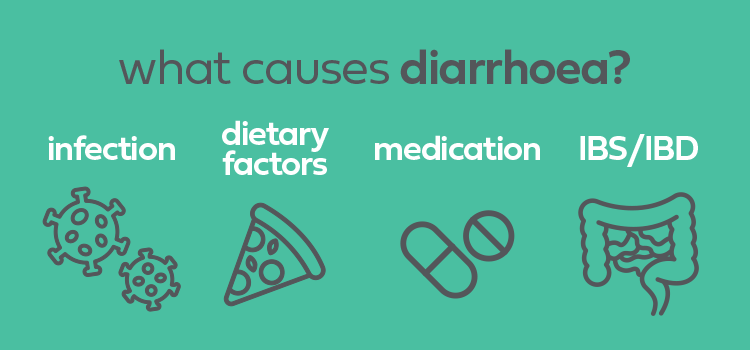What causes diarrhoea?

Diarrhoea, a common digestive ailment which many of us (if not all) have experienced, can disrupt our daily lives and leave us feeling uncomfortable and drained. While it’s often considered a minor inconvenience, understanding its causes, triggers, and effective relief strategies is essential for maintaining overall well-being.
In this week’s expert series we delve into the various aspects of diarrhoea, exploring its underlying causes, reasons for recurrence, the potential role of stress, and providing expert tips to alleviate its symptoms. We also look at our best-selling gut supplement, aguulp for gut, and how its clever formula can help alleviate the symptoms of acute and chronic diarrhoea.
What causes diarrhoea?

Diarrhoea occurs when there is an increase in the frequency, liquidity, and volume of bowel movements. Several factors can contribute to this gastrointestinal distress:
Infection: Bacterial, viral, and parasitic infections can inflame the digestive tract, leading to diarrhoea. Common culprits include Escherichia coli (E. coli), Salmonella, norovirus, and rotavirus.
Dietary Factors:
- Consuming contaminated food or water
- Excessive consumption of greasy or spicy foods
- Food intolerance such as gluten or dairy
- Artificial sweeteners like sorbitol
Medications: Certain antibiotics and antacids containing magnesium for example may disrupt the balance of gut bacteria and cause diarrhoea as a side effect.
Gastrointestinal Disorders: the following conditions can contribute to symptoms of diarrhoea:
- Irritable Bowel Syndrome (IBS): IBS is a chronic disorder characterised by recurrent abdominal pain, changes in bowel habits, and bloating. Diarrhoea-predominant IBS (IBS-D) is one subtype where diarrhoea is a prominent symptom.
- Inflammatory Bowel Disease (IBD): Conditions like Crohn’s disease and ulcerative colitis involve chronic inflammation of the intestines, leading to symptoms such as diarrhoea, abdominal pain, and bloody stools.
- Coeliac Disease: This autoimmune disorder is triggered by the consumption of gluten-containing foods, causing inflammation and damage to the small intestine and resulting in diarrhoea and malabsorption of nutrients.
Stress and Emotional Factors: Stress and anxiety can impact the gut-brain axis, affecting gut motility and secretion. This can lead to stress-induced diarrhoea, where heightened stress levels contribute to changes in bowel habits.
Traveler’s Diarrhoea: When travelling to regions with different sanitation practices, exposure to new bacteria or pathogens can lead to traveller’s diarrhoea. This is often caused by consuming contaminated food or water.
Underlying Medical Conditions: Certain medical conditions, such as hyperthyroidism, diabetes, and chronic kidney disease, can disrupt normal gut function and contribute to diarrhoea.
It’s important to note that persistent or severe diarrhoea should be evaluated by a healthcare professional for accurate diagnosis and appropriate treatment.
Stress: When you experience stress or anxiety, your body releases stress hormones like cortisol and adrenaline. These hormones can have direct effects on the digestive system, altering gut motility, blood flow, and secretion of digestive juices. Here’s how stress can contribute to diarrhoea.
Underlying Medical Conditions: Certain medical conditions, such as hyperthyroidism, diabetes, and chronic kidney disease, can disrupt normal gut function and contribute to diarrhoea.
Why do I have diarrhoea right now?
If you’re currently experiencing diarrhoea, the cause might be related to a recent change in your routine or diet. Consider factors such as recent travel, meals at unfamiliar places, or exposure to sick individuals. Additionally, some infections have an incubation period, meaning symptoms might not appear until days after exposure.
If your symptoms persist or worsen, it’s important to consult a medical professional for accurate diagnosis and treatment.
Why Do I Keep Getting Diarrhoea?

Experiencing recurrent or consistent bouts of diarrhoea can be distressing and often warrants a closer look into the underlying causes. Let’s explore some common reasons why individuals might consistently get diarrhoea:
Chronic Gastrointestinal Disorders:
Conditions like irritable bowel syndrome (IBS), inflammatory bowel disease (IBD), and microscopic colitis are characterised by ongoing gastrointestinal symptoms, including diarrhoea. IBS can cause alternating bouts of diarrhoea and constipation, while IBD (Crohn’s disease and ulcerative colitis) involves chronic inflammation of the digestive tract leading to persistent diarrhoea.
Food Sensitivities and Allergies:
Some individuals may have specific food sensitivities or allergies that trigger consistent episodes of diarrhoea. Common culprits include lactose intolerance, gluten sensitivity, and certain food additives.
Medication Side Effects:
Some medications, particularly those used for chronic conditions, can -cause diarrhoea as a side effect. This is especially common with antibiotics, certain antacids, and medications used to manage diabetes.
Underlying Medical Conditions:
Conditions like hyperthyroidism, diabetes, and disorders affecting the pancreas can disrupt digestive processes and lead to chronic diarrhoea.
Bacterial Overgrowth:
Small intestinal bacterial overgrowth (SIBO) occurs when there is an excess of bacteria in the small intestine. This can interfere with digestion and nutrient absorption, leading to diarrhoea and other gastrointestinal symptoms.
Stress and Anxiety:
Chronic stress and anxiety can exacerbate gastrointestinal symptoms, including diarrhoea. The gut-brain axis plays a significant role in regulating digestion, and ongoing stress can contribute to consistent episodes of diarrhoea.
Dietary Habits:
Consistently consuming foods that your digestive system is sensitive to, eating high amounts of processed or fatty foods, or not getting enough fibre can contribute to chronic digestive issues, including diarrhoea.
Microbiome Imbalance:
An imbalance in the gut microbiota can lead to chronic gastrointestinal symptoms. An altered microbiome can affect digestion and absorption, contributing to diarrhoea.
Inflammatory Conditions:
Chronic inflammatory conditions affecting the gastrointestinal tract, such as diverticulitis or chronic gastritis, can lead to recurrent episodes of diarrhoea.
Can Stress Cause Diarrhoea?

The connection between the brain and the gut is a complex and intricate relationship known as the gut-brain axis. This bidirectional communication system involves the central nervous system (the brain and spinal cord) and the nervous system (the network of nerves that controls the digestive tract). Stress and emotions can significantly impact this communication, leading to a range of gastrointestinal symptoms, including diarrhoea. Here’s how stress can contribute to diarrhoea:
Increased Gut Motility: Stress can speed up the movement of contents through the intestines, leading to rapid transit and less time for water absorption. This can result in loose stools and diarrhoea.
Altered Gut Permeability: Chronic stress can lead to increased gut permeability, often referred to as “leaky gut.” This can allow toxins and undigested food particles to enter the bloodstream, triggering an inflammatory response that affects gut function.
Microbiome Imbalance: Stress can disrupt the balance of the gut microbiota, the community of microorganisms that reside in the digestive tract. This imbalance, known as dysbiosis, can contribute to digestive issues, including diarrhoea.
Changes in Blood Flow: Stress-induced changes in blood flow can impact the functioning of the intestines and lead to irregularities in digestion and absorption.
Immune System Modulation: Stress can influence immune responses in the gut, potentially leading to inflammation and gastrointestinal symptoms.
Types of Stress-Related Diarrhoea:
Stress can trigger different types of diarrhoea, each with its own underlying mechanisms:
Acute stress diarrhoea: Sudden and intense stress can lead to immediate changes in gut motility and secretion, resulting in diarrhoea. This type of stress-induced diarrhoea is often short-lived and subsides once the stressful situation is resolved.
Chronic Stress Diarrhoea: Long-term or chronic stress can have a more sustained impact on the gut. Over time, ongoing stress can lead to persistent changes in gut function, inflammation, and a higher likelihood of experiencing frequent bouts of diarrhoea.
Functional Diarrhoea: Stress can exacerbate certain functional gastrointestinal disorders like irritable bowel syndrome (IBS). IBS is characterised by abdominal pain, changes in bowel habits, and bloating. Stress can trigger or worsen IBS symptoms, including diarrhoea-predominant IBS (IBS-D).
Expert tips to relieve diarrhoea
 Stay Hydrated: Diarrhoea can lead to significant fluid loss, potentially leading to dehydration. It’s crucial to stay well-hydrated by drinking clear liquids such as water, oral rehydration solutions (ORS), clear broths, and diluted fruit juices. Avoid caffeine and alcohol, as they can contribute to dehydration.
Stay Hydrated: Diarrhoea can lead to significant fluid loss, potentially leading to dehydration. It’s crucial to stay well-hydrated by drinking clear liquids such as water, oral rehydration solutions (ORS), clear broths, and diluted fruit juices. Avoid caffeine and alcohol, as they can contribute to dehydration.
Consume Soluble Fibre: Soluble fibre can help absorb excess water in the intestines and add bulk to stools. Foods such as the following are good sources of soluble fibre and can help improve stool consistency.
- Oatmeal
- Cooked carrots
- Applesauce
Soluble fibre can also be taken in supplement form.
Avoid trigger foods: Identify and avoid foods that can exacerbate your symptoms. Greasy, fried, spicy, and dairy-heavy foods are common culprits. Additionally, artificial sweeteners like sorbitol and fructose can trigger diarrhoea in some individuals.
Try supplements: certain supplements can be helpful in alleviating the symptoms of diarrhoea. Here are some supplements that might be considered:
- Probiotics: Probiotics are beneficial bacteria that can help restore the balance of your gut microbiota. They might be particularly helpful if your diarrhoea is due to an imbalance in gut bacteria or as a result of antibiotic use. Look for high-quality probiotic supplements that contain a variety of strains.
- Psyllium: this is a source of soluble fibre that can help absorb excess water in the intestines and add bulk to stools. This can be helpful in cases of mild diarrhoea.
- L-Glutamine: L-Glutamine is an amino acid that supports the health of the intestinal lining. It might help with the healing of the gut and reducing inflammation.
- Zinc: an essential mineral that plays a role in immune function and gut health. Some studies suggest that zinc supplementation might help reduce the duration and severity of diarrhoea.
- Vitamin D: an important for immune function and can support overall gut health. Some research suggests that vitamin D deficiency might be associated with gastrointestinal issues, including diarrhoea.
Electrolytes and rehydration: In cases of diarrhoea with significant fluid loss, oral rehydration solutions that contain electrolytes (sodium, potassium, chloride) can help replenish lost fluids and minerals.
Rest and allow your gut to heal: Resting gives your digestive system a chance to recover and heal. Avoid strenuous activities and give your body time to recuperate.
Manage stress: As discussed earlier, stress can exacerbate diarrhoea. Engage in stress-reduction techniques like meditation, deep breathing, yoga, or engaging in hobbies you enjoy.
Maintain good hygiene: Wash your hands frequently with soap and water to prevent the spread of infection. This is especially important after using the bathroom and before handling food.
Consult a healthcare professional: If your diarrhoea is severe, persistent, accompanied by high fever, blood in stools, or signs of dehydration, seek medical attention. A healthcare provider can accurately diagnose the underlying cause and recommend appropriate treatment.
When to Seek Medical Attention
While many cases of diarrhoea can be managed at home, there are situations where medical intervention is necessary such as if symptoms worsen or are persistent or signs of dehydration start.
Symptoms of dehydration to look out for, include (but not limited to);
- Dizziness
- Light headedness
- Feeling thirsty
- Fatigue/feeling tired
- Headache
- Dry mouth
- Passing urine less frequently
Remember, each individual’s response to diarrhoea can vary, so tailor these tips to your specific needs.
How does aguulp for gut help relieve diarrhoea?
aguulp for gut provides prebiotics fibres in the form of inulin, FOS and XOS that have been shown in studies to help encourage the growth of healthy gut bacteria, which in turn help to regulate and maintain healthy bowel movements. These prebiotic fibres are also combined with an array of other ingredients which have also been shown to support and help maintain healthy digestive function, for example:
- Collagen: shown to help reduce bloating and improve frequency of bowel movements. It is also reported to help move food through the GI tract more smoothly, assisting in the digestion process.
- L-glutamine: an amino acid that has been shown to play an important role in the maintenance and health of the digestive tract. Studies have also shown that L glutamine helps improve stool frequency and consistency.
- Zinc: research has shown that zinc plays an important role in digestive health. It is believed to have a protective effect in a variety of gastrointestinal symptoms such as diarrhoea and other GI ailments. Studies have shown it is useful in the reduction of diarrhoea and improvements in stool consistency.
References:
Konturek PC, Brzozowski T, Konturek SJ. Stress and the gut: pathophysiology, clinical consequences, diagnostic approach and treatment options. J Physiol Pharmacol. 2011 Dec;62(6):591-9. PMID: 22314561.
Greenwood-Van Meerveld B, Johnson AC, Grundy D. Gastrointestinal Physiology and Function. Handb Exp Pharmacol. 2017;239:1-16. doi: 10.1007/164_2016_118. PMID: 28176047.
Lauridsen C. From oxidative stress to inflammation: redox balance and immune system. Poult Sci. 2019 Oct 1;98(10):4240-4246. doi: 10.3382/ps/pey407. PMID: 30371893.
Zhou Q, Verne ML, Fields JZ, Lefante JJ, Basra S, Salameh H, Verne GN. Randomised placebo-controlled trial of dietary glutamine supplements for postinfectious irritable bowel syndrome. Gut. 2019 Jun;68(6):996-1002. doi: 10.1136/gutjnl-2017-315136. Epub 2018 Aug 14. PMID: 30108163; PMCID: PMC9549483.
Laghari GS, Hussain Z, Shahzad H. Effect of Zinc Supplementation on the Frequency and Consistency of Stool in Children with Acute Diarrhea. Cureus. 2019 Mar 11;11(3):e4217. doi: 10.7759/cureus.4217. PMID: 31106100; PMCID: PMC6506273.
Baqui AH, Black RE, El Arifeen S, Yunus M, Chakraborty J, Ahmed S, Vaughan JP. Effect of zinc supplementation started during diarrhoea on morbidity and mortality in Bangladeshi children: community randomised trial. BMJ. 2002 Nov 9;325(7372):1059. doi: 10.1136/bmj.325.7372.1059. PMID: 12424162; PMCID: PMC131175.
Khalighi Sikaroudi M, Mokhtare M, Janani L, Faghihi Kashani AH, Masoodi M, Agah S, Abbaspour N, Dehnad A, Shidfar F. Vitamin D3 Supplementation in Diarrhea-Predominant Irritable Bowel Syndrome Patients: The Effects on Symptoms Improvement, Serum Corticotropin-Releasing Hormone, and Interleukin-6 – A Randomized Clinical Trial. Complement Med Res. 2020;27(5):302-309. English. doi: 10.1159/000506149. Epub 2020 Mar 23. PMID: 32203968.
Qadir MI, Arshad A, Ahmad B. Zinc: Role in the management of diarrhoea and cholera. World J Clin Cases. 2013 Jul 16;1(4):140-2. doi: 10.12998/wjcc.v1.i4.140. PMID: 24303485; PMCID: PMC3845954.


